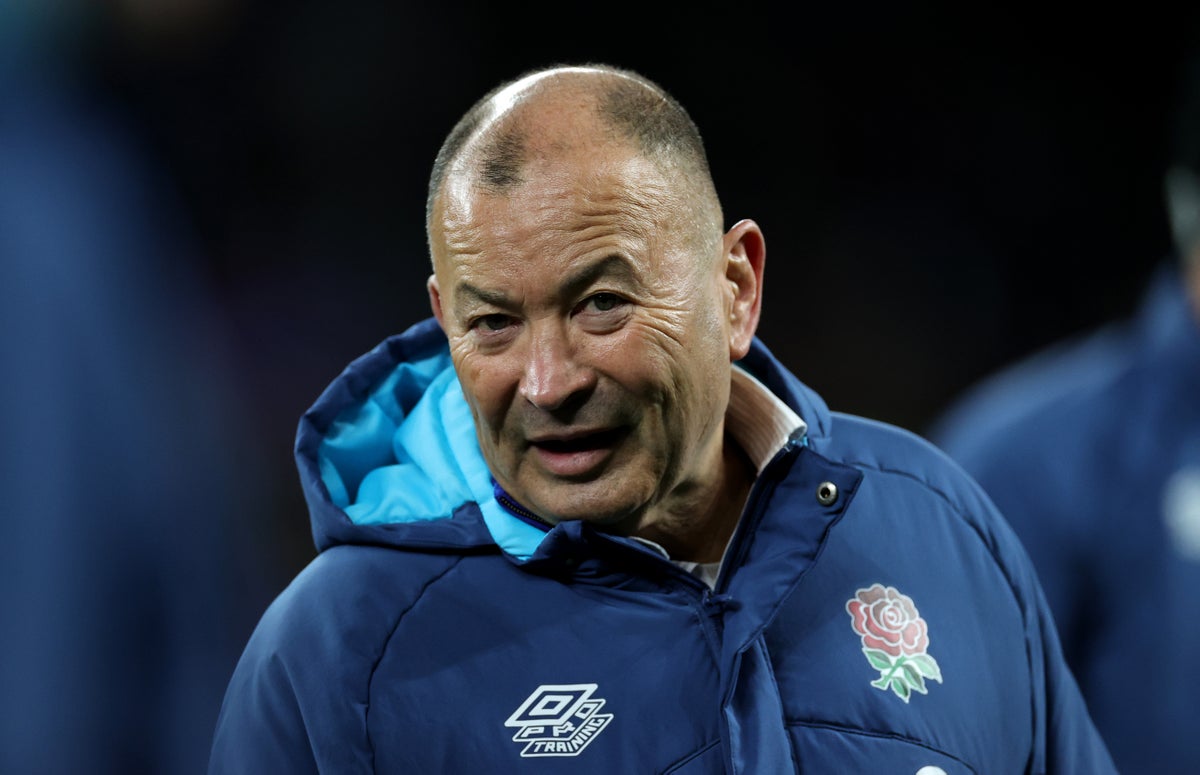
We’re just nine months away from the start of the 2023 Rugby World Cup. With only one Six Nations and a few pre-World Cup warm-up matches left before the global showpiece gets underway, the northern hemisphere contenders are fine-tuning their finals plans for a crack at the Webb Ellis Trophy.
Ireland coach Andy Farrell might be musing over whether Ross Byrne, Joey Carbery or Jack Crowley should be his primary back-up fly-half to Johnny Sexton or whether Stuart McCloskey’s impressive autumn could see him sneak into the starting No 12 jersey ahead of Robbie Henshaw or Bundee Aki.
Meanwhile, France’s Fabien Galthie could be pondering whether the mighty impact of tighthead prop Sipili Falatea off the bench may be better utilised from the start, with Uini Atonio stepping into the replacements instead.
As for England? Well, they’re currently without a head coach having opted to rip up the plans of an entire World Cup cycle right at the death and start again... It’s not exactly a position you’d choose to be in and doesn’t particularly speak to a competent governing body. To say the RFU are taking a huge risk by sacking Eddie Jones would be an understatement – this could easily be a complete disaster. And yet, it is the right call or, at the very least, they were left with no choice.
Jones had turned supporting England into an act of faith (in him) – do you believe, as he always insisted, that everything will come good in France next year despite the evidence in front of your eyes right now or do you think he’s full of rubbish? Is he a charlatan or a savant? Snake oil salesman or rugby genius? Now we’ll never know – at least not for this iteration of Eddie Jones.
England had been in a, seemingly terminal, nosedive ever since the high point of the Jones era – that brilliant victory over New Zealand in the 2019 World Cup semi-final.
South Africa were too good in the 2019 final and, then, the Six Nations performances have got progressively worse year on year, culminating in last spring’s tepid displays. That was the championship, you may remember, that saw a half-hearted RFU review conclude that they were “encouraged by the solid progress the team has made during this Six Nations campaign”.
As a reminder, the “strong positive steps forward” the RFU witnessed came in a championship where England won two and lost three games while scoring eight tries, which came one year after a Six Nations where England won two and lost three games while scoring 12 tries. Solid progress, indeed…

Things got a little better over the summer, as a come-from-behind series win Down Under against an injury-riddled, fairly mediocre Australia side temporarily kept the wolves from the door but they promptly deteriorated again during a dismal autumn. Argentina claimed a first win at Twickenham for 16 years, an improbable, harum-scarum comeback saw an entertaining, if unconvincing, draw snatched with the All Blacks before a Springboks side shorn of their European-based players due to the game falling outside the official Test window outclassed their hosts 27-13.
That final defeat brought a cacophony of boos from the England fans at full-time and the noise seemed to spark RFU CEO Bill Sweeney into action. Little more than a week later, Jones was sacked.
A cynic might suggest Sweeney opportunistically rode the wave of public momentum to take the heat off himself. This is man, after all, coming off a battering at the recent select committee held by the Department for Digital, Culture, Media and Sport investigating the financial demises of Wasps and Worcester Warriors. At that select committee, Sweeney was accused by Julian Knight MP of living in an “ivory tower” before being cuttingly asked the question: “Should you not be looking at your own position?”
The RFU may also have considered the fact that they’ve got three home Six Nations matches and a couple of World Cup warm-ups to sell out Twickenham for in 2023 and the message he took from the supporters’ displeasure after the Springboks loss is that they would not be rushing out to watch Jones’s England.
There are various straws to clutch at to convince yourself that England can still lift the Webb Ellis Trophy in Paris next autumn despite the change in coach and the fact that they’re clearly currently so far behind France, Ireland, South Africa and perhaps New Zealand as well.
After all, in 2006 England fired Andy Robinson and made the World Cup final the following year. Another of rugby’s marmite men, Rassie Erasmus, was parachuted in to salvage the Springboks’ hopes 18 months before the 2019 World Cup and they, of course, went on to lift the trophy. More recently, Wayne Smith had only a matter of months with New Zealand’s women before they did the unthinkable and bested England’s seemingly unbeatable Red Roses in the World Cup final.
Also, on the evidence presented, it was hardly an unfair decision. England’s aimless, misfiring attack has been a tough watch for a while now and a backline without any cohesion seems unable to realise Jones’s masterplan. Finally getting his ‘unicorn’ trio of Marcus Smith, Owen Farrell and Manu Tuilagi together as the 10-12-13 axis this autumn was supposed to enable everything to click into place at last but instead, it was a damp squib. The Smith-Farrell double pivot that everything is predicated upon looks like a complete busted flush.

England won just five of 12 Tests in 2022 – their worst return since 2008. They scored just 27 tries in those 12 Tests and, if you exclude the runaway victories over Japan and Italy, then it’s a meagre 15 tries in 10 matches against top-class opposition. An innovative attacking structure that is predicated on position-less, formation-less rugby rather than the traditional pods of forwards stretched out across the pitch was supposed to give England almost limitless options, with set-piece strike plays cutting the opposition to shreds. Instead, plays were botched and attacks petered out with depressing regularity.
Jones’s abrasive, combative demeanour to, well, pretty much everyone – be that the media, his staff, his players – also loses its ‘charm’ and effectiveness when the results no longer follow. Back in 2018, Bath owner Bruce Craig accused Jones of creating a “bullying culture” and, certainly, few players are effusive in declaring their love of spending time in England camp. An almost ludicrous turnover of backroom coaching staff has also led to a lack of continuity and players looking almost lost on the pitch.
The more the evidence piled up, the less choice the RFU had – they simply had to pull the trigger. Truthfully, it probably should have been done after the 2022 Six Nations to give the new coach (likely Steve Borthwick) an 18-month run-up to the World Cup, rather than a nine-month sprint. Instead, they backed Jones after that ludicrous ‘review’.
The counter-point is that Jones not only leaves with the highest win percentage of any England men’s coach in history but he has made no secret of his focus on the 2023 World Cup – happily sacrificing every other Test match and competition in service of being the best team possible at that tournament. He always claimed a revamped attack would only come to fruition in the second half of the World Cup cycle and that he was keeping all his best stuff back for the tournament itself anyway.
And in his defence, Jones’s entire international coaching career is built on peaking at World Cups: leading Australia to the 2003 final, being technical advisor to the 2007 champion Springboks, engineering the biggest upset in rugby history with the 2015 Brighton Miracle and then taking England to the 2019 final. His teams always dip in the lead-up to the tournament before coming on strong (to varying degrees) on the big stage. Although it’s worth noting he has still never actually won the World Cup, which is ultimately England’s goal next September.
‘Trust in me - I’ve got this, mate’ was his implicit instruction.
The problem with marking yourself out as a messianic figure to be blindly followed is that it not only takes an awful lot of charisma to pull it off but there will always be plenty of disbelievers out there hoping to accelerate your downfall and it normally ends badly for the ‘messiah’ themselves.
For a long time, Jones could count his employers among his faithful disciples but now, the scales have fallen from their eyes and the end has duly come. Sadly, his sacking means we’ll never have the proof of Jones’s England at the 2023 World Cup to provide a definitive answer to the question of whether he’s a charlatan or a savant. Instead, the debate will rage on and, in some ways, that actually feels quite fitting.







